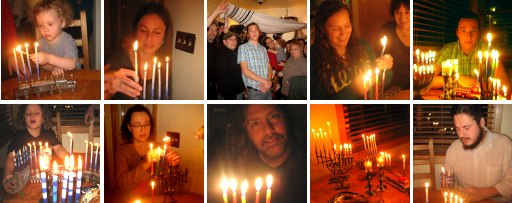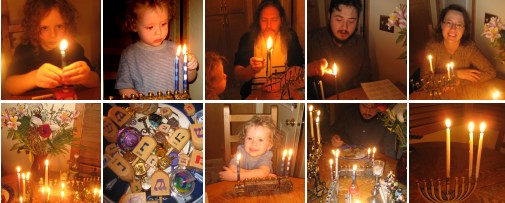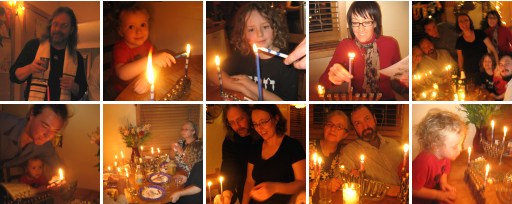|
December 2011 Updates
Happy New Year - for Ugo?

[ Should followers of Yeshua celebrate the civil New Year? Of course we should abstain from the revelry of the world and its carnivals, but should we otherwise regard January 1st as a divinely appointed time to reflect over our lives and make resolutions to change? What is the significance of this date and why was it selected to represent a "new year"? What does the month of "January" mean? Indeed, what relationship, if any, is there between the world's calendar systems and the calendar system outlined in the Scriptures? ]
12.31.11 (Tevet 5, 5772) Often we don't realize what is not being said because of what is being said. In other words, hidden or unspoken assumptions are always at work in communication, though we rarely take the time to seriously examine these assumptions for ourselves. Advertisers, politicians, and others who wish to control your thinking implicitly understand this and therefore regularly employ various techniques to distract you from examining their assumptions. They understand that the louder (or more frequently or more threateningly) something is said, the less likely you will question its truth status or engage in reasonable thinking of your own.... In other words, "truth" for such pragmatists is little more than persuasion. Get the crowd to believe you and you've got the "truth."
Take, for example, the idea that we should all rush about purchasing Christmas presents to give on December 25th, or that we are now about to begin a "New Year." All around the world people are getting ready to celebrate a transitional day that marks the end of one year and the beginning of the next. In most countries of the world, New Year's Day is usually celebrated on January 1st, though this date comes from the arbitrary decree of the consuls of ancient (and pagan) Rome -- not from anything taught in the Hebrew Scriptures. Some Christian churches plan their own New Year's celebrations, offering a service to make resolutions and to offer up special prayers. (Because it falls eight days after December 25th, some Roman-influenced churches observe this date as the "Feast of Christ's Circumcision.") Many mainline churches plan "midnight" communion services so that the sacraments could be taken just before the start of the "new year." Now while all this might be encouraging and helpful in some ways, it needs to be stressed that the civil New Year that the world celebrates is not a Biblical holiday at all, and in fact is opposed to the Biblical Calendar that was revealed in the Torah and Scriptures.
The study of the various calendar systems used in the world is highly convoluted and intricate. Consider, for example, the ancient calendars of the Egyptians, the Summerians (i.e., Babylonians), and the Aztecs. Or consider the Druid legends and Stone Henge.... Indeed, there are numerous calendar systems that have been developed throughout human history -- some based on the appearance of the moon (lunar calendars), some based on the sun (solar calendars), and still others based on various astrological signs and omens (the Aztecs followed the movements of the planet Venus, and the Romans counted backwards from fixed points of the moon's cycle and considered months of 29 days to be unlucky).
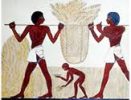
The Torah designates the month of Nisan (Scripturally called aviv, or "Spring") as the first month of the year (Exod. 12:2). Originally, then, the Hebrew calendar was lunar and observational. When the new moon was sighted, a new month begun. Since the Torah also identified Sukkot as "the end of the (harvest) year" (Exod. 23:16), the sages of the Mishnah later identified the Fall month of Tishri (i.e., the "seventh month") as the start of a new year.... During the Babylonian exile (6th century BC), Babylonian names for the months (i.e., Tammuz) were adopted. This might harken back to the earlier Summerian Calendar of Abraham's day...
By the time the Mishnah was compiled (200 AD), the sages had identified four new-year dates for every lunar-solar year (the modern Jewish calendar was apparently ratified by Hillel the Elder in the 3rd century AD):
- Nisan 1 - (Rosh Chodashim) This is the start of the year from the point of view of the Scriptures. Nisan 1 marks the start of the month of the Exodus from Egypt and the beginning of Jewish national history. Nisan 1 is also the first for counting the Festivals of the Hebrew Calendar and for counting the reign of kings.
- Elul 1 - This is the start of the year from the point of view of tithing of cattle for Temple sacrifices. Since the Second Temple was destroyed in 70 AD, the rabbis decreed that this date should mark the time of Selichot, or preparation for repentance before Rosh Hashanah.
- Tishri 1 - After the destruction of the Second Temple, the rabbis decreed that Tishri 1 would mark the start of the year from the point of view of Jewish civic life. Tishri 1 therefore is called Rosh Hashanah ("head of the year") that begins a ten-day "trial" of humanity that climaxes on the Day of Atonement (Yom Kippur).
- Shevat 15 - (Tu B'Shevat) This is the start of the year from the point of view of tithing of fruit trees. Today Tu B'Shevat represents a national Arbor Day in Israel, with tree planting ceremonies in Israel.
In practical terms, however, there are two "New Years" in Jewish tradition. The first occurs two weeks before Passover (Nisan 1) and the second occurs ten days before Yom Kippur (the other two "new years" are not regularly observed, except by the ultra-orthodox). The first New Year is Biblical and is called Rosh Chodashim (see Exod. 12:2). This is the month of the redemption of the Jewish people -- and it is also the month in which Yeshua was sacrificed upon the cross at Moriah for our sins. Oddly enough for most Christians, "New Years Day" should be really celebrated in the spring....
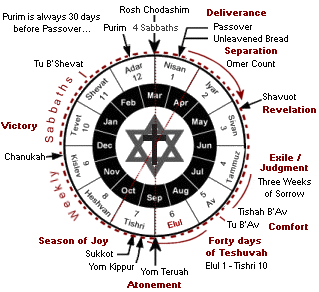 |
All of this is in striking contrast, however, with the most widely used calendar in the world today -- the "Gregorian Calendar" -- named after Pope Gregory XIII who reigned over the Catholic Church in the 1500's.
The Gregorian Calendar, considered to be a revision to the Julian Calendar (which was itself a revision of the pagan Roman/Greek calendars) retains most of the names of the days of the week and months of the year from pagan Rome (and therefore, ancient Greece). The ancient Greeks named the days of the week after the sun, the moon and the five known planets (Mars, Mercury, Jupiter, Venus, and Saturn) which themselves were associated with the gods Ares, Hermes, Zeus, Aphrodite, and Cronus, respectively:
- Sunday. Latin: dies solis - "Sun Day." Sunday celebrates the sun god, Ra, Helios, Apollo, Ogmios, Mithrias, or the sun goddess, Phoebe. In the year 321 AD, the Roman Emperor Constantine ruled that the first day of the week, 'the venerable day of the sun', should be a day of rest. The name was later changed to dies Dominica, "Lord's Day" in ecclesiastical tradition.
- Monday. Latin: lunae dies - "Moon Day." Monday was named in honor of the Assyrian goddess, Selene, Luna and Mani. In old English, mon(an)daeg meant "day of the moon."
- Tuesday. Latin: dies Martis - "Day of Mars." In Greek mythology Ares was the god of war (renamed "Mars" by the Romans). In English, "Tuesday" comes from Tiu (Twia), the English/Germanic god of war and the sky (identified with the Nordic god called Tyr).
- Wednesday. Latin: dies Mercurii - "Day of Mercury." In Greek mythology Hermes was the god of trade and commerce (renamed "Mercury" by the Romans). In English, the name "Wednesday" derives from the Scandinavian god Odin, the chief god of Norse mythology. Woden is the chief Anglo-Saxon/Teutonic god, the leader of the Wild Hunt.
- Thursday. Latin: dies Iovis - "Day of Jupiter." In Greek mythology Zeus was the god of the sky (renamed "Jupiter" by the Romans). The English word "Thursday" comes from the Middle English Thorsday, refering to "Thor" (the Nordic counterpart to Jupiter).
- Friday. Latin: dies Veneris - "Day of Venus." In Greek mythology Aphrodite was the goddess of love/fertility (renamed "Venus" by the Romans). The name "Friday" comes from Freya (Fria), the name of the Norse god Odin's wife and Teutonic goddess of love, beauty, and fertility.
- Saturday. Latin: dies Saturni - "Day of Saturn." In Greek mythology Cronus was the god of the harvest (renamed "Saturn" by the Romans) who ruled until dethroned by his son Zeus.
Likewise the names of the months ("moons") have pagan-Roman connections. The month of "January," for instance, is named on behalf of Janus, the two-faced Roman "god of doorways" who had one face looking forward and one backward ("Janus faced"). March is named after Mars, the god of war; April for the fertility goddess Aphrodite, July is named on behalf of Julius Caesar, August for Augustus Caesar, and so on.... Of course, the Gregorian Calendar of the Roman church tradition assimilated the pagan pantheon into its own liturgical calendar, as the Latin names of the days and months reveal.
אֶל־דֶּרֶךְ הַגּוֹיִם אַל־תִּלְמָדוּ
וּמֵאתוֹת הַשָּׁמַיִם אַל־תֵּחָתּוּ
כִּי־יֵחַתּוּ הַגּוֹיִם מֵהֵמָּה
כִּי־חֻקּוֹת הָעַמִּים הֶבֶל הוּא
el · de·rekh · hag·go·yim · al · til·ma·du
ume·o·tot · ha·sha·ma·yim · al · te·cha·tu
ki · ye·cha·tu · hag·go·yim · me·hem·ah
ki · chuk·kot · ha·a·mim · he·vel · hu

"Learn not the way of the Gentiles,
nor be dismayed at the signs of the heavens
because the Gentiles are dismayed at them,
for the customs of the nations are vanity."
(Jer. 10:2-3)

It frankly baffles me that certain Christian theologians and preachers can be so meticulous about certain doctrines (such as justification by faith alone, the definition of the "church," the "inerrancy" of Scripture, the exact formula for baptism, etc.) and yet be seemingly oblivious to the fact that the modern, institutionalized Church inherits much of its substance and practice from pagan Rome... True, the Jews themselves adopted pagan names of the months from ancient Babylonia, but the Torah (as opposed to Jewish tradition) calls months (and days) by their ordinal number (the "first" month, the "second" month, etc.), and explicitly mentions that the New Year begins in Spring (aviv). So, while I'd like to wish you all a "Happy New Year," I'd like to wait until Nisan 1 (or alternatively, until Tishri 1)! Meanwhile, I hope and pray that you draw close to our Lord Yeshua, regardless of the time or day! Shalom Chaverim...
Μὴ ἀγαπᾶτε τὸν κόσμον μηδὲ τὰ ἐν τῷ κόσμῳ. ἐάν τις ἀγαπᾷ τὸν κόσμον,
οὐκ ἔστιν ἡ ἀγάπη τοῦ πατρὸς ἐν αὐτῷ - 1 Jn 2:15
Addendum: I am not suggesting that we should reject the secular calendar in preference to the Biblical calendar, at least for everyday, practical matters in this world. Conventionally we all use the words "Monday," "Tuesday," "January," "February," and so on without regard for the pagan associations of these names, and since we live in a secular culture, we are constrained to use the same terms as the culture around us, especially regarding times, dates, etc. Nevertheless I think it's worthwhile contrasting the Biblical view of the calendar with that of the pagan world around us, especially since this reveals the disparity between the "Greek" and "Hebrew" mindsets so clearly. Our Jewish Lord and Messiah told us that we were "in but not of" the world, after all (John 17:5).
Moreover I am concerned that the predominantly Gentile Church has unthinkingly adopted many assumptions of the pagan world and has thereby become gravely out of touch with the divine calendar and the prophetic purpose of the festivals of the LORD. Perhaps this is a result of the almost intractable problem of "Covenant Theology" or its ideological twin, "Dispensationalism," two interpretative methods that are used by various church theologians as they read the Scriptures. Churches that teach "Covenant Theology" advocate a form of "Replacement Theology," claiming that Israel should really be identified with the Gentile "church." On the other hand, churches that teach "Dispensationalism" consider the "Old Testament" to be worthy of instruction but really applicable only to the Jewish people (the Pauline epistles and perhaps the Gospel of John, on the other hand, are intended for the predominantly Gentile church). I believe that both approaches misread the Scriptures. How can a so-called Christian claim that the "King of the Jews" lives in his heart when he hates the Jewish people? (For more on this subject, see this article).
 |
Shabbat Table Talk for Vayigash
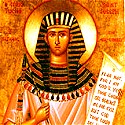
[ The following brief entry is related to this week's Torah reading (Vayigash). Please read the Torah portion to "find your place" here. ]
12.30.11 (Tevet 4, 5772) Our Torah portion this week includes a lot of high drama and suspense. As Benjamin stood before Joseph unjustly accused of the theft of a chalice, his brother Judah "drew near" (vayigash) and offered to bear his penalty in his place, pleading with Joseph to spare his father the loss of yet another son. Greatly moved by this act of selflessness, Joseph decided the time had come to finally reveal his identity to his brothers...
After clearing the room of the Egyptians, he said to them, "You told me that Benjamin's brother is dead. Are you certain of this or not?" "Yes, your excellency, we are sure. He is dead." Joseph then spoke in Hebrew: "How can you lie like that? You sold him as a slave. How can you know that he is dead? Indeed, I purchased him as a slave and can call him right now. With that, Joseph began calling out, "Joseph! Joseph! Joseph son of Jacob, come here immediately! Come and speak to your brothers." The brothers eyes widened as they looked around the room to see if Joseph was in fact coming. When Joseph saw this, he then said, "Whom are you looking for? I am Joseph – is my father alive?" (Gen. 45:3).
It's an old custom to discuss the weekly Torah portion with your family (and friends) during the Sabbath. Toward that end I wrote up a new Shabbat "Table Talk" for Parashat Vayigash chaverim. Like others you can find on this site, first I include a brief summary of the weekly Torah reading followed by a set of questions and answers regarding the text. Hopefully this material will prompt some interesting (and enjoyable) discussion for your Sabbath. You can download the PDF file from the linked page (above) or by directly clicking here:
Vayigash means "and he drew near," referring to Judah's intercession on behalf of his family, but the root word is used throughout the Scriptures to refer to drawing near to God for salvation, healing, and life... God calls you to "draw near" to Him for relationship... Since He is a Person, the LORD wants to know you as a person. He is not interested in formulaic prayers, religious rituals, or your membership at a particular religious organization. God wants to know your inmost thoughts and heart. He wants you to be real, to be honest, to be who you are... Drawing near to God is God's way of drawing near to you... In other words, as you draw near to God, He will draw near and touch you. God wants you to boldly draw near to Him because He perfectly understands that He alone is what you really need.
בְּרוּכִים אַתֶּם לַיהוָה
עשֵׂה שָׁמַיִם וָאָרֶץ
be·ru·khim · a·tem · ladonai
o·seh · sha·ma·yim · va·a·retz

"May you be blessed by the LORD,
the Maker of heaven and earth!"
(Psalm 115:15)

The Heart of Faith
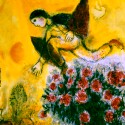
12.29.11 (Tevet 3, 5772) The story of the "rich young ruler" is found in Mark 10:17-27 and Luke 18:18-27. As the Great Physician, Yeshua always perfectly diagnosed a person's source of trouble, the underlying cause of his disease, so to speak. The rich man was inwardly conflicted, "two-souled" (δίψυχος), and therefore like a proverbial "divided house" that is unable to stand. On the one hand he believed in the "karma" principle that doing good would necessarily yield blessing and riches for your life (this was the logic of Job's "comforters" who used the corollary principle to blame Job for his pains), while on the other hand he ran up to Yeshua and kneeled before him - confessing his spiritual poverty and inner destitution... His conscience was undoubtedly troubled. He wondered if keeping the commandments was "as good as it gets." When he called Yeshua "good," Yeshua tested him by saying that this attribute was God's alone - i.e., "Who do you say I am?" And while the rich man honestly had "kept the commandments" from his youth, Yeshua told him that this was not enough.... Yeshua looked upon the man "and loved him," which was the very answer to his quandary. Salvation, eternal life, and real riches are only made possible because of the scandalously lavish love of God, which is revealed to the heart of one who trusts in the message of Yeshua.
The essence of Torah is to "love the LORD with all your heart, with all your soul, with all your might" -- and yet this is the very problem, since none of us is able to do that apart from the miracle of spiritual rebirth (i.e., being in a personal, honest, and loving relationship with God) through Yeshua our Savior. The LORD calls us to live in a loving, personal relationship that is made possible through Yeshua, who opens the door to the Divine Presence. God wants us to love Him because He understands that He alone is our heart's desire, our "pearl of great price," and our everlasting treasure...
 |
Joseph and the Good Eye

[ Happy Chanukah, chaverim! The following brief entry is related to this week's Torah reading (Vayigash). Please read the Torah portion to "find your place" here. ]
12.28.11 (Tevet 2, 5772) The phrase hester panim (הֶסְתֵר פָּנִים) means "hiding of the face." It is often used when discussing the Book of Esther, where God's Name isn't mentioned even once, yet the hidden Presence is manifest in the outcome of the story. In this sense of the term, hester panim is somewhat like the sun on an overcast day: Just because you don't see it doesn't mean it isn't there. God's providential care for us is at work at all times, whether we perceive it or not.
The eye of emunah (faith) ultimately affirms: gam zu l'tovah (גַּם זוּ לְטוֹבָה), "this too is for good" (cp. Rom. 8:28). Notice that the affirmation is not gam zu tovah - "this is the good," but rather gam zu l'tovah - "this, too, is for good." Emunah "sees what is invisible" (2 Cor. 4:18) and understands (i.e., accepts) that the "present form of this world is passing away" for purposes that are good (1 Cor. 7:31). It affirms that underlying the surface appearance of life (chayei sha'ah) is a deeper reality (chayei olam) that is ultimately real, abiding, and ultimately designed for God's redemptive love to be fully expressed. In this world we must "see through" a mirror (i.e., indirectly) to begin to see the dawn of our eternal home; but one day we will behold God panim el panim (פָּנִים אֶל־פָּנִים), "face to face" (1 Cor. 13:12).
Among other things the story of Joseph reveals how God's hidden hand moves for good in our lives. Despite the betrayal of the pit, and the unjust suffering of the prison house, there was light, exaltation, and joy to come forth. God knows how to take our emptiness to yield "storehouses in Egypt..." As Joseph later told his brothers, "you meant evil against me, but God meant it for good" (Gen. 50:20). Resist the temptation to judge by mere appearances. Forbid your sorrow to blind the eyes of faith. Do not unjustly judge God's purposes or try to understand His ways; accept that He works all things together (συνεργέω) for good -- making even the very wrath of man to praise Him...
וּמֵעוֹלָם לא־שָׁמְעוּ לא הֶאֱזִינוּ
עַיִן לא־רָאָתָה אֱלהִים זוּלָתְךָ
יַעֲשֶׂה לִמְחַכֵּה־לוֹ
u'me·o·lam · lo · sham·u · lo · ha·e·zi·nu
a·yin · lo · ra·a·ta · E·lo·him · zu·la·te·kha
ya·a·seh · li·me·cha·keh · lo

"From eternity no one has heard or perceived by the ear,
no eye has seen a God beside you
who works for those who wait for him"
(Isa. 64:4)
Note that Isaiah 64 centers upon the need for mercy and healing from sin – and ultimately on the salvation of the LORD who "works for those who wait for Him." King David said something similar: "I cry out to God Most High, to God who is perfecting me" (Psalm 57:2). The Apostle Paul links Isa. 64:4 with 1 Cor. 2:7-9 by stating that the wisdom of God's plan of salvation – the wisdom of God in mystery (θεοῦ σοφίαν ἐν μυστηρίῳ) exceeds all expectations of human wisdom or design. Note that Paul added the phrase "neither have entered into the heart of man" (a phrase used elsewhere in the Torah) to indicate that God's salvation was utterly and unimaginably beyond all human apprehension in Yeshua's wonder and glory. This is fundamental to the "good news" of the gospel message itself: It is God's wisdom and salvation alone that heals, completes, and perfects us... God Himself works for those who are trusting in Him...
 |
(Left-to-right) 1. Olga and Judah; 2. Josiah lights the menorah; 3. John and Judah;
4. Mary Beth lights the menorah; 5. Yasha lights the menorah
Zot Chanukah...
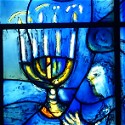
[ The following is related to the holiday of Chanukah, which runs from Dec. 20th - 28th this year. From our family to you - may you be filled with peace, love, and the true light that only the Messiah Yeshua can give... Happy Chanukah! ]
12.27.11 (Tevet 1, 5772) Tonight is called "zot Chanukah," the last night of the festival when we will light all nine of the candles in the Chanukah menorah. Zot chanukah derives its name from the Torah reading for the 8th day, which sums up the gifts given to dedicate the Tabernacle (Num. 7:84). The Hebrew reads, זאת חֲנֻכַּת הַמִּזְבֵּחַ בְּיוֹם הִמָּשַׁח אתוֹ / "This is the dedication (chanukah) of the altar, in the day of its being anointed..." Notice that the Hebrew words for dedication, altar, and mashiach all appear in this verse.
Here are some pictures of the last two days of Chanukah (sorry about the poor color quality and smaller size). We have enjoyed eating holiday foods (including latkes, and Christmas sufganiyot), singing hymns, playing dreidel, and enjoying great fellowship for the last week. We wish you could have joined us!
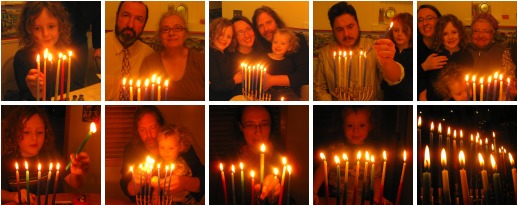 |
(Left-to-right: Day 6) 1. Josiah; 2. Vadim and Irina; 3. John, Olga, and boys;
4. Peter and Josiah; 5. Olga and kids with grandparents;
(bottom: Day 7): 1. Josiah looks at the menorahs; 2. John and Judah; 3. Olga lights menorah;
4. Judah with seven candles; 5. Chag Urim - holiday of Lights!
Parashat Vayigash - ויגש

[ Happy Chanukah, chaverim! The following entry is related to this week's Torah reading (Vayigash). Please read the Torah portion to "find your place" here. ]
12.26.11 (Kislev 30, 5772) In this week's Torah we read about Joseph's dramatic revelation of his identity to his long lost brothers. Recall that it was on account Judah's heartfelt intercession that Joseph was finally convinced that the brothers had undergone teshuvah (repentance) and therefore had truly changed. Spiritually speaking, these were not the same brothers who had thrown him into a pit years before.... Notice also that immediately after he revealed himself to the brothers Joseph asked about the welfare of his father Jacob: אֲנִי יוֹסֵף הַעוֹד אָבִי חָי / ani Yosef, ha'od avi chai / "I am Joseph; is my father alive?" Joseph's first concern was for his aged father, whom he had not seen since he was a teenage boy, some 22 years earlier.
The Torah states that Joseph was 17 years old when he was sold into slavery (Gen. 37:2). According to Jewish tradition, he was with Potiphar for a year and then thrown into prison for another 12 years. At age 30, therefore, the Pharaoh promoted Joseph to be governor of Egypt (Gen. 41:46). If he had been away from his father for a total of 22 years, that leaves nine years when he was governor of Egypt before he was reunited with his Jacob (Gen. 45:6). But why, then, did he allow his father to mourn for these extra nine years? After all, the land of Canaan was only a few days journey away, and Joseph certainly could have dispatched a messenger at any time with the news that he was alive. So why did Joseph continue to let his father mourn over his supposed death? If he was so concerned about the welfare of Jacob, why didn't he send word to his father that he was indeed alive?
To help explain this apparent inconsistency, the Jewish commentator Nachmanides (1194-1270) wrote that Joseph regarded his dreams as prophecies. In his first dream, his eleven brothers bowed down to him; in his second, his father was included too. Joseph concluded that the first dream must be realized in its entirety before the second one would be fulfilled. In other words, had he sent a message back home, Jacob certainly would have come to see Joseph immediately - but then the second dream would have come true before the first. Since he was a master of dream interpretation and understood the proper sequence of dreams, Joseph therefore waited until after all eleven of his brothers (including Benjamin) had come to him before he revealed his identity to his brothers and instructed them to bring his father down to Egypt.
Other Jewish sages say that Joseph was concerned that God would punish his brothers for selling him into slavery, and therefore he waited to ensure that they had genuinely repented. By definition, repentance (teshuvah) is demonstrated when the transgressor finds himself in the same situation as when he was tempted to sin in the first place, but this time chooses not to sin. Only after Joseph saw that their repentance was complete did he reveal himself and instruct the brothers to let his father Jacob know that he was still alive. Had Joseph let his father know earlier that he was still alive, his brothers would never have had the opportunity to undergo teshuvah. Notice further that according to Jewish tradition Joseph never told Jacob about his betrayal by his brothers -- not even when Jacob was on his deathbed. His love forbade him to engage in lashon hara (evil speaking) or to bring further pain to his father...
The revelation of Joseph and his reconciliation with his brothers is a prophetic picture of the acharit hayamim (end of days) when the Jewish people will come to understand that Yeshua is indeed the One seated at the right hand of the majesty on high as Israel's Deliverer. At that time Yeshua will speak comforting words to His long lost brothers and restore their place of blessing upon the earth.
The entire story of Joseph is rich in prophetic insight regarding Yeshua. Vayigash (וַיִּגַּשׁ) means "and he drew near," referring first to Judah's intercession for the sins of his brothers, and then to Joseph's reciprocal desire for the brothers to draw near to him (Gen. 44:18, 45:4). Joseph initiated the reconciliation by saying, גְּשׁוּ־נָא אֵלַי / g'shu na elai - "Please draw near to me," and indeed there is a play on the verb nagash (נָגַשׁ), "draw near," throughout this story. Yeshua is depicted in both Judah's intercession (as the greater Son of Judah who interceded on behalf of the sins of Israel) and in Joseph's revelation as the exalted Savior who draws the Jewish people back to Himself. When Joseph disclosed himself and asked, "Is my father alive," we hear Yeshua evoking the confession of faith from the Jewish people. Upon His coming revelation, all Israel will confess that indeed God the Father is "alive" and has vindicated the glory of His Son.
 |
(Left-to-right) 1. John with boys; 2. Josiah lights the menorah; 3. Judah lights his menorah;
4. Olga and Judah (age 2); 5. Five candles (plus shamash)
He was born to die...
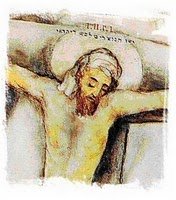
12.24.11 (Kislev 28, 5772) As I've mentioned elsewhere on this site, if Yeshua was born in the fall during the festival of Sukkot (i.e., "Tabernacles"), then his miraculous conception (i.e., incarnation) would have occurred nine months earlier, sometime around Chanukah. Put the other way, if Yeshua were conceived in late Kislev (Nov/Dec), he would have been born 40 weeks later during Sukkot. For more information about this somewhat controversial subject, see the article, "Christmas: Was Jesus really born on December 25th?"
Regardless of your particular conviction regarding the date of Yeshua's birth, the most important thing to remember is that He was born to die (Heb. 10:5-7). The story of his birth is only significant in relation to His sacrificial death (Mark 8:27-33). The "manger" scene leads directly to the Cross at Moriah. Indeed, in Jewish tradition the day of one's death is more important than the day of one's birth, since death summarizes the meaning and significance of a person's life in this world. Birth represents potential, whereas death represents inheritance... Therefore the Jewish custom is to commemorate the anniversary of a person's death (Yahrzeit: יארצייט) and not the date of his or her birth. This custom is derived from the Scriptures themselves: "A good name is better than precious ointment, and the day of death than the day of birth" (Eccl. 7:1):
טוֹב שֵׁם מִשֶּׁמֶן טוֹב
וְיוֹם הַמָּוֶת מִיּוֹם הִוָּלְדוֹ
tov · shem · mi·she·men · tov
ve·yom · ha-ma·vet · mi·yom · hiv·va·le·do

"A good name is better than fragrant oil,
and the day of death than the day of birth."
(Eccl. 7:1)
The day of Yeshua's death represents the message of the Gospel story itself: "God so loved the world that He gave His only begotten Son, that whoever believes in Him should not perish but have eternal life" (John 3:16). This is of "first importance": Yeshua was born to die for our sins, to make us right with God, and was raised from the dead to vindicate the righteousness of God (1 Cor. 15:3-5). "For our sake God made Him to be sin who knew no sin, so that in him we might become the righteousness of God" (2 Cor. 5:21). The birth of the Messiah (or rather His incarnation) was the "first step" toward His sacrifice for our deliverance (Heb. 2:9-18).
כִּי כּה אָהַב אֱלהִים אֶת־הָעוֹלָם
עַד כִּי נָתַן אֶת־בְּנוֹ יְחִידוֹ
לְמַעַן לא־יאבַד כָּל־הַמַּאֲמִין בּוֹ
אֵלָּא יִנְחַל חַיֵּי עוֹלָם
ki · ko · a·hav · E·lo·him · et · ha·o·lam
ad · ki · na·tan · et · be·ni · ye·chi·do
le·ma·an · lo · yo·vad · kol · ha·ma·a·min · bo
el·lah · yin·chal · chai·yei · o·lam

"For this is the way God loved the world:
He gave his one and only Son,
so that everyone who trusts in him will not perish
but have eternal life."
(John 3:16)
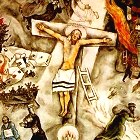
Οὕτως γὰρ ἠγάπησεν ὁ θεὸς τὸν κόσμον,
ὥστε τὸν υἱὸν αὐτοῦ τὸν μονογενῆ ἔδωκεν,
ἵνα πᾶς ὁ πιστεύων εἰς αὐτὸν μὴ ἀπόληται,
ἀλλ᾽ ἔχῃ ζωὴν αἰώνιον.
Yeshua came to earth and emptied himself (κένωσις) of His regal glory and power in order to be our High Priest of the New Covenant. The life he lived in complete surrender to the Father was meant to demonstrate that He alone is the efficacious Healer and High Priest (Mediator) of us all: "But [He] made himself nothing (εκενωσεν), taking the form of a slave, being born in the likeness of men; and being found in human form, he brought himself low by becoming obedient to the point of death, even death on a cross" (Phil 2:7-8). "There is therefore now no condemnation for those who are in Yeshua the Messiah. For the law of the Spirit of life has set you free in Yeshua the Messiah from the law of sin and death. For God has done what the law, weakened by the flesh, could not do. By sending his own Son in the likeness of sinful flesh and for sin, he condemned sin in the flesh, in order that the righteous requirement of the law might be fulfilled in us, who walk not according to the flesh but according to the Spirit" (Rom. 8:1-4).
Though Christmas is customarily the time that many people observe the birth of the Messiah and Savior, it is surely appropriate to celebrate Yeshua's glory as our risen King and Lord every day of our lives.... Therefore I sincerely wish each and every one of you a wonderful Christmas Season. May we all take time to reflect upon the profound gift of the One who was so great that He emptied Himself (κένωσις) of all His regal glory and power to be clothed in human flesh in order to die as our sin offering before the Father.
כָּבוֹד לֵאלהִים בַּמְּרוֹמִים
וְשָׁלוֹם עֲלֵי־אֲדָמוֹת בִּקֵרֵב אַנִשֵׁי רְצוֹנוֹ
ka·vod le·lo·him ba·me·ro·mim,
ve·sha·lom a·lei-a·da·mot bi·ke·rev a·ni·shei re·tzo·no

"Glory to God in the highest
and peace among those with whom he is pleased"
(Luke 2:14)
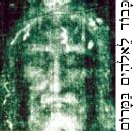
(Download Study Card)
By putting our trust in Yeshua, we partake in His chayei olam - eternal life - sharing in His invincible love. He is faithful and true, our Prince of Peace and Beloved Savior. Yehi Shem Adonai mevorakh: יְהִי שֵׁם יְהוָה מְברָךְ - "Blessed be the Name of the Lord."
Note: For a brief Hebrew meditation on Isaiah 9:6 ("Unto us a child is born"), see "Promised Child and Son."
Chanukah Same'ach!

12.24.11 (Kislev 28, 5772) Last evening we celebrated both Shabbat and the fourth day of Chanukah with some friends over at our house. We ate Chinese food (a Jewish favorite for Chanukah) and spent some time discussing the Torah portion for the week. Afterward we sang some hymns and spent some time in prayer. It was a wonderful time of fellowship, chaverim, and I wish you had been there. Here are a few pictures of the occasion:
Left-to-right (top): 1. Judah; 2. Beth lights a menorah; 3. blessing under the tallit;
4. Sophia and Nancy; 5. Yasha at the table
(bottom): 1. Josiah looks at the menorahs; 2. Olga lights a menorah; 3. John smiling;
4. the chanukah table; 5. Peter lights a menorah
During this season and always -- may you be filled with peace, love, and the true light that only the Messiah Yeshua can give... Happy Chanukah!
Shabbat Table Talk for Miketz
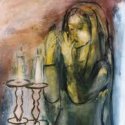
[ The following is related to this week's Torah reading, Parashat Miketz. Please read the Torah portion to "find your place" here. Shabbat Shalom and Chanukah Same'ach! ]
12.23.11 (Kislev 27, 5772) I wrote up a new Shabbat "Table Talk" for Parashat Miketz, chaverim. Like others I've written, first I include a brief summary of the weekly Torah reading followed by a set of questions and answers regarding the text. Hopefully this material will prompt some interesting (and enjoyable) discussion for your Sabbath. You can download the PDF file from the linked page (above) or by directly clicking here:
We wish you a wonderful Shabbat, a joyful Chanukah, and a meaningful Christmas season, chaverim...
הִנְנִי עוֹמֵד לְיַד הַדֶּלֶת וְדוֹפֵק
אִישׁ כִּי יִשְׁמַע אֶת קוֹלִי וְיִפְתַּח אֶת הַדֶּלֶת
אֶכָּנֵס אֵלָיו וְאֶסְעַד אִתּוֹ וְהוּא אִתִּי
hi·ne·ni · o·med · le·yad · ha-de·let · ve·do·fek
ish · ki · yish·ma · et · ko·li · ve·yif·tach · et · ha·de·let,
e·ka·nes · e·lav · ve·es·ad · it·to · ve·hu · it·ti

"Listen! I am standing at the door knocking...
If anyone hears My voice and opens the door, I will come in to him,
and will dine with him, and he with Me."
(Rev. 3:20)

The Father of Lights
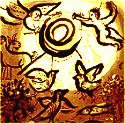
[ The following is related to the holiday of Chanukah, which runs from Dec. 20th - 28th this year. From our family to you - may you be filled with peace, love, and the true light that only the Messiah Yeshua can give... Happy Chanukah! ]
12.22.11 (Kislev 26, 5772) The holiday of Chanukah is ultimately about giving, since it marks the season that God chose to give His Son to the world as our Savior (via the incarnation). Yeshua is indeed "the Light of the World," the true light that enlightens every person who is born (John 1:9). As the Source of all light, His power is irrepressible, invincible, and overcomes every shade of darkness. Yeshua is the Logos (Λόγος), the underlying reason that sustains all of creation.
כָּל מַתָּנָה טוֹבָה וְכָל מַתָּנָה שְׁלֵמָה
יוֹרֶדֶת מִמַּעַל מֵאֵת אֲבִי הָאוֹרוֹת
אֲשֶׁר כָּל שִׁנּוּי וְכָל צֵל חִלּוּף אֵין בּו
kol · mat·ta·nah · to·vah · ve·khol · mat·ta·nah · she·le·mah
yo·re·det · mi·ma·al · me·et · A·vi · Ha·o·rot
a·sher · kol · shin·nuy · ve·khol · tzel · chil·luf · ein · bo

"All generous giving and every perfect gift is from above,
coming down from the Father of lights (אֲבִי הָאוֹרוֹת)
with whom there is no variation of light or shadow due to change."

πᾶσα δόσις ἀγαθὴ καὶ πᾶν δώρημα τέλειον ἄνωθέν ἐστιν
καταβαῖνον ἀπὸ τοῦ πατρὸς τῶν φώτων,
παρ᾽ ᾧ οὐκ ἔνι παραλλαγὴ ἢ τροπῆς ἀποσκίασμα.
(James 1:17)
Unlike the motions of the heavenly bodies, God's Light remains constant and supreme over all of creation, without the slightest trace of diminution or variation... Just as we know that the Sun is still shining even on the cloudiest of days, so we understand that the Divine Presence is always there -- always giving, always shining, always loving us... We can trust in the power of our God to help us, since His radiance and truth pervade the darkness to enlighten our way (Psalm 112:4). As Jesus said, "I have come into the world as light, so that whoever believes in me may not remain in darkness" (John 12:46).
Chosen for Praise...

[ The following is related to the holiday of Chanukah, which runs from Dec. 20th - 28th this year. From our family to you - may you be filled with peace, love, and the true light that only the Messiah Yeshua can give... Happy Chanukah! ]
12.22.11 (Kislev 26, 5772) The festival of Chanukah celebrates how God calls us out of our inner darkness into His marvelous light.... Indeed the Apostle Peter said that we were chosen by God for this very purpose:
אֲבֲל אַתֶּם עַם נִּבְחָר
מַמְלֶכֶת כּהֲנִים וְגוֹי קָדוֹשׁ עַם סְגוּלָּה
לְמַעַן תְּסַפְּרוּ תְּהִלּוֹתָיו שֶׁל הַקּוֹרֵא אֶתְכֶם
מֵחשֶׁךְ אֶל אוֹרוֹ הַנִּפְלָא
a·val · at·tem · am · niv·char
mam·le·khet · ko·ha·nim · ve·goy · ka·dosh · am · se·gul·lah
le·ma·an · te·sa·pe·ru · te·hil·lo·tav · shel · ha·ko·rei · et·khem
me·cho·shekh · el · o·ror · ha·nif·la

"But you are a chosen people,
a kingdom of priests and a holy nation, a people for God's own possession,
so that you may declare the praises of Him who called you
out of darkness into His marvelous light."

(1 Pet. 2:9)
We are a "chosen people" - am nivchar - for the purpose of offering praise to God for His salvation (yeshuah). In this connection it is helpful to remember that the Hebrew word "Jew" (יְהוּדִי) comes from a root (יָדָה) which means to "thank" or to "praise." The Apostle Paul alluded to this by saying that a Jew whose heart has been circumcised by the Spirit is "one who is praised by God -- not by men (Rom. 2:29). Being a Jew therefore means being "chosen" to receive special blessings and grace to live in holiness for the glory of God and for the welfare of the world. God is the source and the power of what makes a true Jew a tzaddik. After all, Israel was meant to be a "light to the nations" (Isa. 42:6; 60:3), and God had always planned for all the families of the earth to come to know Him and give Him glory through Abraham (Gen. 12:3). "Jewishness" is therefore not an end in itself but rather a means to bring healing truth to the nations... Indeed, the entire redemptive story of the Scriptures is about the cosmic conflict to deliver humanity from the "curse" by means of the "Seed of the woman" who would come. Any talk of ancestry, bloodlines, lineage, and so on must be understood as a means to this greater redemptive end.
We praise God for for opening our spiritually blind eyes to apprehend His Presence... God's light is marvelous (θαυμαστός) because it shines in the darkness to reveal God's love for sinners like us.... The purpose of light is to reveal, to disclose what is real, and to manifest the truth. The Divine Light represents God's self-disclosure to creation. The Lord's love is entirely unique, irrepressible, wonderful, remarkable, and scandalously unpredictable... It disguises itself in lowliness to tenderly woo those who are downcast: "The LORD is near to the brokenhearted and saves the crushed in spirit" (Psalm 34:18). Therefore Peter continues by citing Hosea 2:23: "Once you were not a people (לא־עַמִּי), but now you are God's people (עַמִּי־אַתָּה); once you had not received mercy (לא רֻחָמָה), but now you have received mercy" (1 Pet. 2:10; also Rom. 9:25-26).
וְרִחַמְתִּי אֶת־לא רֻחָמָה
וְאָמַרְתִּי לְלא־עַמִּי
עַמִּי־אַתָּה וְהוּא יאמַר אֱלהָי
ve·ri·cham·ti · et · lo · ru·cha·mah
ve·a·mar·ti · le·lo · am·mi
am·mi · at·tah · ve·hu · yo·mar · E·lo·hai

I will have mercy on 'No Mercy'
and I will say to 'Not My People'
'You are my people,' and they will say, 'You are my God!'

(Hosea 2:23)
"Arise, shine, for your light has come, and the glory of the LORD has risen upon you. For behold, darkness will cover the earth, and thick darkness the peoples; but the LORD will arise upon you, and his glory will be seen upon you" (Isa. 60:1-2). May this season be a time of revelation, power, and joy for you...
Chanukah Day 2

12.22.11 (Kislev 26, 5772) We celebrated the second day of Chanukah quietly at home this evening. Here are a few pictures of the occasion, chaverim:
Left-to-right (top): 1. Josiah places the shamash; 2. Judah lights his menorah; 3. John;
4. Peter lights the shamash; 5. Olga at the table
(bottom): 1. the table lit up; 2. dreidels; 3. Judah enjoys the sight;
4. Eating the simchah meal; 5. Two candles (plus the shamash)
We are living in darkened days, chaverim... In such a time as this, we must remain true to our convictions and seek to strengthen our faith. The powers of darkness shall never prevail over the truth and love of God. Regarding the overmastering power of the Divine Light and Salvation of God, King David affirmed:
אִם־תַּחֲנֶה עָלַי מַחֲנֶה לא־יִירָא לִבִּי
אִם־תָּקוּם עָלַי מִלְחָמָה בְּזאת אֲנִי בוֹטֵחַ
im · ta·cha·neh · a·lai · ma·ch·aneh · lo · yi·ra · lib·bi,
im · ta·kum · a·lai · mil·cha·mah, · be·zot · a·ni · vo·te·ach

Though an army encamp against me, my heart shall not fear;
though war arise against me, yet I will be confident.
(Psalm 27:3)

Download Study Card
This is a major theme of Chanukah - retelling the victory of faith in the LORD God of Israel despite ubiquitous godlessness and worldly oppression.... Nonetheless, what are we to do with those who hate us? How are we to regard the enemies of the gospel message? A sage once remarked, "After 120 years, I would rather be rebuked for loving someone without cause than for hating someone with a cause." His words agree with those of Yeshua who told us to love our enemies and to pray for those who persecute us (Matt. 5:44). Extending agape (ἀγάπη) -- unconditional love -- is not optional for a follower of the Messiah, even if we are confronted with an army that is encamped against us...
בְּעוֹד הָאוֹר עִמָּכֶם הַאֲמִינוּ בָּאוֹר
לְמַעַן תִּהְיוּ בְּנֵי הָאוֹר
be·od · ha·or · im·ma·khem · ha·a·mi·nu · ba·or,
le·ma·an · tih·yu · be·nei · ha·or

"While you have the light, believe in the light,
that you may become children of light" - Jesus
ὡς τὸ φῶς ἔχετε, πιστεύετε εἰς τὸ φῶς, ἵνα υἱοὶ φωτὸς γένησθε
(John 12:36)
Chanukah Day 1

12.21.11 (Kislev 25, 5772) We celebrated the first day of Chanukah at our home with some family members and friends. It was a precious time reciting the blessings, lighting the candles, eating latkes, listening to music, praying, and just spending some time together. We wish you could have been there... From our family to yours: Chag Urim Same'ach!
Left-to-right (top): 1. Kiddush for yom tov; 2. Judah lights his menorah; 3. Josiah loves Chanukah;
4. our good friend Mary Beth; 5. playing dreidel after dinner
(bottom): 1. Yaakov lights the 1st candle; 2. the table filled with menorahs; 3. John and Olga;
4. Vadim and Irina; 5. Judah looks at his menorah
Happy Chanukah!
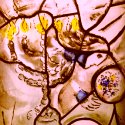
[ Chanukah starts tonight! You can light the first candle anytime after sunset. From our family to you: Chanukah Same'ach (happy Chanukah!) ]
12.20.11 (Kislev 25, 5772) It is somewhat ironic that the only reference to the festival of Chanukah occurs in the New Testament, not in the Tanakh (i.e., the Old Testament). In the Gospel of John we read that Yeshua was at the Temple in Jerusalem during the "Feast of Dedication" (חַג חֲנוּכָּה), that is, Chanukah (John 10:22). During a season of remembering miracles (nissim), Yeshua pointed out that the works that He did attested to His claim to be the long-awaited Messiah of the Jewish people (John 10:37-38). His works and character clearly displayed the true Light of who He was, and these works still shine to us today.
אֲנִי יְהוָה קְרָאתִיךָ בְצֶדֶק וְאַחְזֵק בְּיָדֶךָ
וְאֶצָּרְךָ וְאֶתֶּנְךָ לִבְרִית עָם לְאוֹר גּוֹיִם׃
לִפְקחַ עֵינַיִם עִוְרוֹת לְהוֹצִיא מִמַּסְגֵּר אַסִּיר
מִבֵּית כֶּלֶא ישְׁבֵי חשֶׁךְ׃
a·ni · Adonai · ke·ra·ti·kha · ve·tze·dek · ve·ach·zek · be·ya·de·kha
ve·etz·tzor·kha · ve·e·ten·kha · liv·rit · am · le·or · goy·im;
lif·ko·ach · ei·na·yim · iv·rot · le·ho·tzi · mi·mas·ger · as·sir
mi·bet · ke·le · yosh·vei · cho·shekh

"I am the LORD; I have called you in righteousness;
I will strongly take you by the hand and guard you;
I will give You as a Covenant to the people, a Light for the nations,
to open the eyes that are blind, to bring out the prisoners from the dungeon,
from the prison house those who sit in darkness."
(Isa. 42:6-7)
As Mashiach ben Yosef, the prophesied Suffering Servant, Yeshua is the Ultimate Shamash - He is our Servant Light who gives out the sacred fire of sacrificial love to guide us on our way in this world. Whoever follows Him will not have darkness, but the Light of Life:
וְהוֹלַכְתִּי עִוְרִים בְּדֶרֶךְ לא יָדָעוּ
בִּנְתִיבוֹת לא־יָדְעוּ אַדְרִיכֵם
אָשִׂים מַחְשָׁךְ לִפְנֵיהֶם לָאוֹר
וּמַעֲקַשִּׁים לְמִישׁוֹר
אֵלֶּה הַדְּבָרִים עֲשִׂיתִם וְלא עֲזַבְתִּים
ve·ho·lakh·ti · iv·rim · be·de·rekh · lo · ya·da·u
bin·ti·vot · lo · ya·du · ad·ri·khem
a·sim · mach·shakh · lif·ne·hem · la·or
u·ma·a·ka·shim · le·mi·shor
el·lah · ha·de·va·rim · a·si·tim · ve·lo · a·zav·tim

"And I will lead the blind in a way that they do not know,
in paths that they have not known I will guide them.
I will make dark places before them turn to light,
and perverse things into uprightness.
These things I will do, and I will not forsake them."
(Isa. 42:16)
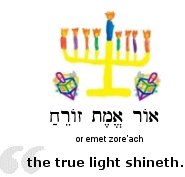
Note that the Hebrew word ma'akashim (מַעֲקַשִּׁים), often translated as "crooked," comes from a root word (עִקֵּשׁ) meaning "perverse" or "twisted," and therefore most accurately describes the inner twisting caused by iniquity and sin... Yeshua is our Good Shepherd (הָרעֶה הַטּוֹב) who drives away the inner darkness, heals us of our perversity, and leads us into the land of God's righteousness.... Praise His Name forever...
Beatitudes of Humility

12.20.11 (Kislev 24, 5772) "Blessed are those who weep while the world goes on laughing, for theirs is the kingdom of heaven; blessed are the meek, for they shall overcome; blessed are those who realize they know little, for they shall find treasure; blessed are those who realize they are unrighteous, for they shall find healing; blessed are the misfits who are disowned by the world as fools, for they shall find mansions in heaven; blessed are the weak, for they shall be made strong; blessed are those who weep, for they shall obtain eternal consolation; blessed are those who refuse to assimilate into this world and its idols, for they shall be called victors in the world to come..."
God turns everything "upside down," for what is esteemed in this world is regarded as vanity in the world to come, and vice-versa. Indeed, the wisdom of this world is based on what I have called the "devil's logic," that is, the evil notion that "truth" is essentially a political tool used to exploit others. The devil's logic is devoid of transcendental reality and therefore relies on compromise and "tolerance" to define truth as a form of "consensus" and "group think." Invariably this approach leads to ambiguity, confusion, cowardice, barbarity, absurdism, madness, and cruelty...
הוֹי הָאמְרִים לָרַע טוֹב וְלַטּוֹב רָע
שָׂמִים חשֶׁךְ לְאוֹר וְאוֹר לְחשֶׁךְ
שָׂמִים מַר לְמָתוֹק וּמָתוֹק לְמָר
הוֹי חֲכָמִים בְּעֵינֵיהֶם
וְנֶגֶד פְּנֵיהֶם נְבנִים
hoy · ha-omrim · lara · tov · velatov · ra,
samim · choshekh · le'or · ve'or · lechoshekh,
samim · mar · lematok · umatok · lemar;
hoy · chakhamim · be'einehem
veneged · penehem · nevonim

"Woe to those who call evil good and good evil,
who put darkness for light and light for darkness,
who put bitter for sweet and sweet for bitter!
Woe to those who are wise in their own eyes,
and shrewd in their own sight."
(Isa. 5:20-21)

The Scriptures teach, "Light is sown for the righteous (tzaddikim), and joy for the upright (yashar) in heart" (Psalm 97:11). During this Chanukah season, may it please the LORD God to renew our courage to live wholeheartedly according to His truth, and to resist the pressure to conform to the idolatry of this world. Amen.
Chanukah and Eschatology
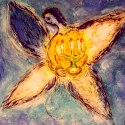
12.19.11 (Kislev 23, 5772) Tomorrow at sundown we begin to celebrate the eight day festival of Chanukah... It has been said that the liturgy of the Jew is the calendar, and that next to God, the great rule of conduct it to respect the gift of time -- and to observe the appointed festivals. Awareness of time is fundamental to the Jewish approach to life.
The LORD God of Israel is a God of order, and the Biblical calendar prophetically reveals the times and the seasons of our salvation. Just as the spring festivals signify the first coming of Yeshua as Mashiach ben Yosef, the Suffering Servant of the LORD, so the fall festivals signify his second coming as Mashiach ben David, the great king who will rule over Zion (and indeed over all the earth). But whereas the holidays of Rosh Hashanah, Yom Kippur, and Sukkot picture the return of Yeshua and the national salvation of the Jewish people, the winter holiday of Chanukah pictures the final victory to come in heaven itself, when the darkness of evil has been entirely vanquished by the everlasting Divine Presence in our midst....
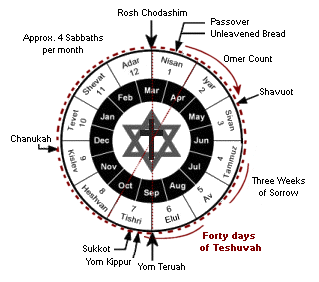 |
Eight is a number that represents God's grace... Like Passover and Sukkot, Chanukah is an eight day holiday, though the reason why we light our menorah for eight days (adding a candle for each additional day) is to commemorate the miracle surrounding the rededication of the Temple. When the Temple stood in Jerusalem, the Golden Menorah was required to be lit every day. Only specially prepared olive oil could be used as its fuel, however, which took seven full days to prepare. When the Jews recaptured the Temple from the Hellenistic Syrians, the first thing they did was to rekindle the menorah, though they only had a single flask of oil - enough to last just one day. After the menorah was lit, however, the flames continued to burn for full eight days - long enough for new oil to be produced. Today we light our menorahs for eight days to recall this miracle.
קוּמִי אוֹרִי כִּי בָא אוֹרֵךְ
וּכְבוֹד יְהוָה עָלַיִךְ זָרָח
ku·mi · o·ri · ki · va · o·rekh
u·khe·vod · Adonai · a·layikh · za·rach

"Arise, shine, for your light has come,
and the glory of the LORD has risen upon you."
(Isa. 60:1)

Hebrew Study Card
We live in the prophetic hope of Chanukah's ultimate fulfillment... "The sun shall be no more your light by day, nor for brightness shall the moon give you light; but the LORD will be your everlasting light (אוֹר עוֹלָם), and your God will be your glory. Your sun shall no more go down, nor your moon withdraw itself; for the LORD will be your everlasting light (אוֹר עוֹלָם) and your days of mourning shall be ended...." (Isa. 60:19-20).
Meanwhile we are living during the great twilight hour of human history, a time of great darkness wherein we are commanded to shine like stars for Yeshua: "Become blameless and pure, children of God without fault in a crooked and depraved generation, in which you shine like stars in the universe" (Phil. 2:15). "At one time you were darkness, but now you are light in the Lord. Walk as children of light (בְּנֵי אוֹר); for the fruit of light (פְּרִי הָאוֹר) is found in all that is loving and righteous and true (חֶסֶד וְצֶדֶק וֶאֱמֶת)... Have no part in unfruitful works of darkness, but instead expose them. For it is shameful even to speak of the things that they do in secret. But everything exposed by the light becomes manifest, for what makes manifest is light. Therefore it says, "Awake, O sleeper, and arise from the dead, and the Messiah will shine on you." Look carefully then how you walk, not as unwise but as wise, making the best use of the time, because the days are evil" (Eph. 5:8-16).
"The LORD is God and he has made light shine upon us" (אֵל יְהוָה וַיָּאֶר לָנוּ), therefore "let your light so shine before men, that they may see your good works, and glorify your Father which is in heaven" (Matt. 5:16). For God, who said, "Let light shine out of darkness," has shone in our hearts to give the light of the knowledge of the glory of God in the face of Yeshua our Messiah" (2 Cor. 4:6). May the LORD God of Israel help us reflect back the glory He shines upon us as we put our heartfelt trust in Him. May God help us all shine with the love and grace of Yeshua... Amen.
 |
The Importance of Chanukah

12.19.11 (Kislev 23, 5772) The word chanukah (חֲנֻכָּה) means "dedication," a word that shares the same root as the Hebrew the word chinukh (חִנּוּךְ), meaning "education." Just as the Maccabees fought and died for the sake of Torah truth, so we must wage war within ourselves and break the stronghold of apathy and indifference that the present world system engenders (Rom. 12:2; Eph. 6:11-18). We must take time to educate ourselves by studying the Torah and New Testament, for by so doing we will be rededicated to the service of the truth and enabled to resist assimilation into the corrupt world. "Love not the world, neither the things that are in the world..." (1 John 2:15).
During this time of year -- and especially during this dark hour of history near the prophesied "end of days" -- it is imperative to remember that we are in the midst of the great "war of the ages," where people's souls and destinies are at stake... This world is likened to the "Valley of Decision," the corridor to the world to come... We cannot afford to be indifferent to the darkness that continues to blind the eyes of so many people. We must take a stand for God's truth and be fully equipped to give an account for the hope we have in Yeshua. Ultimately the "cleansing of the Temple" is a matter of the heart, chaverim....
We are all called to "fight the good fight of faith" and to take hold of the eternal life given to us in Yeshua our LORD (1 Tim. 6:12). Among other things this means refusing to assimilate with the corrupt world system (Κόσμος) and forfeiting our identity in Yeshua.... Chanukah is a "fighting holiday" -- a call to resist the oppression of this world and to rededicate our lives entirely to God.... Indeed, of all the people in the world, Christians who love Yeshua should should understand the true meaning of Chanukah and to rejoice that the Yeshua our Messiah overcame this world.
For those who want some additional information about why Chanukah is so important, please see the article, "Let your light shine - Why Christians should celebrate Chanukah." I hope you will find it encouraging, chaverim.
כָּךְ יָאֵר נָא אוֹרְכֶם לִפְנֵי בְּנֵי אָדָם
לְמַעַן יִרְאוּ אֶת מַעֲשֵׂיכֶם הַטּוֹבִים
וִיכַבְּדוּ אֶת־אֲבִיכֶם שֶׁבַּשָׁמָיִם
kakh · ya·er · na · o·re·khem · lif·nei · be·nei · a·dam
le·ma·an · yir·u · et · ma·a·se·khem · hat·to·vim
vi·kha·be·du · et · a·vi·khem · she·ba·sha·ma·yim

"Let your light so shine before men,
that they may see your good works,
and glorify your Father in heaven"
(Matt. 5:16)
Οὕτως λαμψάτω τὸ φῶς ὑμῶν ἔμπροσθεν τῶν ἀνθρώπων,
ὅπως ἴδωσιν ὑμῶν τὰ καλὰ ἔργα,
καὶ δοξάσωσιν τὸν πατέρα ὑμῶν τὸν ἐν τοῖς οὐρανοῖς

During this holiday season and forever: "May the God of hope (אלהֵי הַתִּקְוָה) fill you with all joy and peace in believing (שִׂמְחָה וְשָׁלוֹם בָּאֱמוּנָה), so that by the power of the Holy Spirit (עז רוּחַ הַקּדֶשׁ) you may abound in hope" (Rom. 15:13). May you be filled with the light of hope. Chag Urim Same'ach - "Happy Festival of Lights!"
Note: According to modern Judaism the holiday of Chanukah is called the "Festival of Lights" (i.e., chag urim), because when the Macabees recaptured the Temple from the Hellenistic Syrians (on Kislev 25, c. 165 BC), the flames of the Golden Menorah continued to burn for full eight days on a single supply of olive oil, and this was considered a miracle. In his account of the institution of the festival, however, the historian Josephus wrote: "And from that time to the present we observe this festival, which we call the "Festival of Lights" (chag urim), giving this name to it, I think, from the fact that the right to worship appeared to us at a time when we hardly dared hope for it" (Antiquities 12.7.6). In other words, the miracle of the "light" was understood by Josephus to refer to autonomous Temple worship, free of earlier forms of Hellenistic political pressure to the contrary...
 |
Parashat Miketz - מקץ
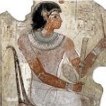
[ Note: Chanukah runs from Tuesday Dec. 20th (i.e., Kislev 25) through Wednesday, Dec. 28th this year. The weekly Torah reading is not suspended for Chanukah (as it is for Passover and Sukkot), though additional Torah readings are read for each of the eight days of the holiday. ]
12.18.11 (Kislev 22, 5772) The Torah reading for this coming Shabbat (which occurs on the fourth day of Chanukah) is parashat Miketz. As this portion opens, Jacob's favored son Joseph had been languishing in prison for 12 years, but the time had finally arrived for him to fulfill the dreams given to him as a young man. In this connection, I list some of the ways that Joseph is a "type" or foreshadowing of the coming Yeshua as the Suffering Servant (see "Mashiach ben Yosef"). The revelation of Joseph and his reconciliation with his brothers is a prophetic picture of acharit ha-yamim (the "End of Days") when Israel, in Great Tribulation, will come to Yeshua as Israel's deliverer. Presently, the veil is still over the eyes of the Jewish people and they collectively regard Yeshua as an "Egyptian" of sorts. For more information, please see the summary page for Miketz.
Note: If it pleases God I will add some additional commentary to parashat Miketz later this week. Meanwhile Happy Chanukah and blessings to you, chaverim.
 |
Free Chanukah Blessing Cards

[ Note: Chanukah begins Tuesday Dec. 20th this year. If you have never personally experienced your own Chanukah celebration, let me encourage you to purchase a Chanukah menorah and light the candles along with us this year. Step by step instructions are provided on the Chanukah pages on this site, chaverim. ]
12.18.11 (Kislev 22, 5772) The Chanukah Blessings page includes some free "Hebrew Study Cards" you can use for your Chanukah celebrations. Each card includes the Hebrew text, phonetic transliteration, and English translation for the blessing. In addition I have recorded Hebrew audio clips for the Chanukah blessings as well, so you can listen to the Hebrew as your learn to recite the blessings...
To make it a bit easier during the candle lighting celebration, I have created a handy one page summary of the blessings you can download here. I hope you find this material helpful, chaverim! Chag Chanukah Sameach (חַג חֲנֻכָּה שָׂמֵחַ)!
הָאוֹר מֵאִיר בַּחשֶׁךְ וְהַחשֶׁךְ לא הִשִּׂיגוֹ
ha-ohr · me·ir · ba·cho·shekh, · ve·ha·cho·shekh · lo · his·si·go

"The light shines in the darkness, and the darkness will never overcome it"
(John 1:5)
καὶ τὸ φῶς ἐν τῇ σκοτίᾳ φαίνει, καὶ ἡ σκοτία αὐτὸ οὐ κατέλαβεν
Shabbat Table Talk for Vayeshev

[ The following is related to this week's Torah reading, Parashat Vayeshev. Please read the Torah portion to "find your place" here. ]
12.16.11 (Kislev 20, 5772) I wrote up a new Shabbat "Table Talk" for Parashat Vayeshev, chaverim. Like others I've written, first I include a brief summary of the weekly Torah reading followed by a set of questions and answers regarding the text. Hopefully this material will prompt some interesting (and enjoyable) discussion for your Sabbath. You can download the PDF file from the linked page (above) or by directly clicking here:
Despite the madness and depravity of this world, I wish you a hearty "Shabbat Shalom," chaverim.... God will keep you in complete peace as you keep your trusting focus upon Him. "Trust in the LORD forever, for in the LORD Yah is eternal strength."
יֵצֶר סָמוּךְ תִּצּר שָׁלוֹם שָׁלוֹם כִּי בְךָ בָּטוּחַ
בִּטְחוּ בַיהוָה עֲדֵי־עַד כִּי בְּיָהּ יְהוָה צוּר עוֹלָמִים
ye·tzer · sa·mukh · titz·tzor · sha·lom · sha·lom · ki · ve·kha · ba·tu·ach
bit·chu · vadonai · a·di-ad, · ki · be·Yah · Adonai · tzur · o·la·mim

"You keep him in complete peace whose mind is stayed on you,
because he trusts in you.
Trust in the LORD forever, for in the LORD Yah is eternal strength."
(Isa. 26:3-4)
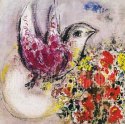
Yeshua Our True Light...

12.15.11 (Kislev 19, 5772) In the Gospel of John it is recorded that Yeshua said, "I am the way, the truth, and the life" (i.e., ᾽Εγώ εἰμι ἡ ὁδὸς καὶ ἡ ἀλήθεια καὶ ἡ ζωή). The Greek word translated "truth" in this verse is aletheia (ἀλήθεια), a compound word formed from an alpha prefix (α-) meaning "not," and lethei (λήθη), meaning "forgetfulness." (In Greek mythology, the "waters of Lethe" induced a state of oblivion or forgetfulness.) Truth is therefore a kind of "remembering" something forgotten, or a recollecting of what is essentially real. Etymologically, the word aletheia suggests that truth is also "unforgettable" (i.e., not lethei), that is, it has its own inherent and irresistible "witness" to reality. People may lie to themselves, but ultimately the truth has the final word... "The light shines in the darkness, and the darkness has not overcome it" (John 1:5).
Greek scholars note that the word lethei itself is derived from the verb lanthano (λανθάνω), which means "to be hidden," so the general idea is that a-letheia (i.e., truth) is non-concealment, non-hiddenness, or (put positively) revelation or disclosure. Thus the word of Yeshua - His message, logos (λόγος), revelation, and presence - is both "unforgettable" and irrepressible. Yeshua is the Unforgettable One that has been manifest as the express Word of God (דְּבַר הָאֱלהִים). Yeshua is the Light of the world (אוֹר הָעוֹלָם) and the one who gives us the "light of life" (John 8:12). Though God's message can be supressed by evil and darkened thinking, the truth is regarded as self-evident and full of intuitive validation (see Rom. 1:18-21).
The Hebrew word for truth (i.e., emet: אֱמֶת) comes from a verb (aman) that means to "support" or "make firm." There are a number of derived nouns that connote the sense of reliability or assurance (e.g., pillars of support). The noun emunah (i.e, אֱמוּנָה, "faithfulness" or "trustworthiness") comes from this root, as does the word for the "faithful ones" (אֱמוּנִים) who are "established" in God's way (Psalm 12:1). A play on words regarding truth occurs in the prophet Isaiah: אִם לא תַאֲמִינוּ כִּי לא תֵאָמֵנוּ / im lo ta'aminu, ki lo tei'amenu: "If you are not firm in faith, you will not be firm at all" (Isa. 7:9; see Faith Establishes the Sign). Without trust in the LORD, there is no stability... Truth is something trustworthy, reliable, firm, or sure. In colloquial English, for example, this idea is conveyed when we say, "He's a true friend...", indicating that the loyalty and love of the person is certain. The familiar word "amen" likewise comes from this root. Speaking the truth (dibbur emet) is considered foundational to moral life: "Speak the truth (דַּבְּרוּ אֱמֶת) to one another; render true and perfect justice in your gates" (Zech. 8:16). Yeshua repeatedly said, "Amen, Amen I say to you...." throughout his teaching ministry to stress the reliability and certainty of God's truth (Matt. 5:18, 26, etc.). Indeed, Yeshua is called "the Amen, the faithful and true witness" (Rev. 3:14).
The relationship between the Hebrew and the Greek ideas seems to be that the revelation of God - the aletheia - is reliable and strong. The source for all truth in the world is found in the Person and character of the LORD God of Israel... The self-disclosure of the LORD is both unforgettable - both in the factual and moral sense - as well as entirely trustworthy. Aletheia implies that truth is something that should never be forgotten. Hence we are regularly commanded and encouraged not to "forget" the LORD (Deut. 8:11, Psalm 103:2, etc.), to "remember" his covenants, to "keep" his ways, to "guard" His precepts, and so on.
The Scriptures attest that Yeshua is the true Light (אוֹר אֱמֶת) that comes from eternity to give light and revelation for all mankind:
הָאוֹר הָאֲמִתִּי הַמֵּאִיר לְכָל־אָדָם
בָּא אֶל־הָעוֹלָם
ha·ohr · ha·a·mi·ti · ha·me·ir · le·khol · a·dam
ba · el · ha·o·lam

"[This is] the true light that shines to all men
who come into the world"
(John 1:9)
῏Ην τὸ φῶς τὸ ἀληθινόν, ὃ φωτίζει πάντα ἄνθρωπον
ἐρχόμενον εἰς τὸν κόσμον

During this Chanukah Season -- and always -- may the LORD God of Israel help us walk in the unforgettable and irrepressible radiance of His glory. May God help us shine with good works that glorify God's Name (Matt. 5:16). "For God, who said, 'Let light shine out of darkness' (יְהִי אוֹר וַיְהִי־אוֹר), has shone in our hearts to give the light of the knowledge of the Glory of God in the face of Yeshua the Messiah" (2 Cor. 4:6).
כִּי־עִמְּךָ מְקוֹר חַיִּים
בְּאוֹרְךָ נִרְאֶה־אוֹר
ki · im·me·kha · me·kor · cha·yim
be·or·kha · nir·eh · ohr

"For with You is the fountain of life;
in Your light do we see Light"
(Psalm 36:9)
Blessed Forgiveness...
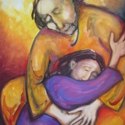
12.15.11 (Kislev 19, 5772) The Hebrew word Torah (תּוֹרָה) is often translated "law" in our Bibles, even though the word comes from a root word (i.e., yarah: יָרָה) that means "to shoot an arrow" or "to hit the mark." Torah is therefore better understood as God's direction or will for our lives rather than a set of legal rules to obey (Hebrew uses other words to describe legal commandments, divine decrees, and so on). Indeed the word most commonly translated as "sin" in our Bibles is chata'ah (חֲטָאָה), which expresses the negative corollary of "missing the mark," as an archer might miss his target when shooting an arrow. Metaphorically speaking, chata'ah is matter of "missing the target" of God's instruction for your life. Do you see how the words "Torah" and "chata'ah" are complimentary ideas? Therefore the New Testament defines sin as being "apart from Torah," living in a form of inner "lawlessness" (ἀνομία) that comes from refusing God's direction (1 John 3:4).
Just as "Torah" serves as a general word to refer to obeying God's will, so chata'ah is a general word that refers to disobeying it; and just as there are more specific terms that are used to express God's will (e.g., mitzvot [commandments], mishpatim [rules] and chukkim [decrees], and so on), so there are more specific words to express different categories or types of chata'ah. One of these words is pesha (פֶּשַׁע), a willful transgression done to spite God. This word suggests defiance, rebellion, and a casting off of God's authority. In most Bibles, pesha is translated as "transgression," meaning "going beyond the limits" of God's Torah (law). Another such word is avon (עָוֹן), usually translated as "iniquity" in our Bibles. Avon is connected with the idea of perversion, or a willful twisting and distorting of the will of God for selfish ends.
In Psalm 32, the Holy Spirit reveals the happiness that rises within the heart of someone who understands that their transgression (pesha) is forgiven, their sin (chata'ah) is covered, and their iniquity (avon) is no longer regarded by the LORD:
אַשְׁרֵי נְשׂוּי־פֶּשַׁע כְּסוּי חֲטָאָה
אַשְׁרֵי אָדָם לא יַחְשׁב יְהוָה לוֹ עָוֹן
וְאֵין בְּרוּחוֹ רְמִיָּה
ash·rei · ne·suy · pe·sha · ke·suy · cha·ta·ah
ash·rei · a·dam · lo · yach·shov · Adonai · lo · a·von
ve·ein · be·ru·cho · re·mi·yah

"Blessed is the one whose transgression (pesha) is forgiven,
whose sin (chata'ah) is covered.
Blessed is the man to whom the LORD regards no iniquity (avon),
and in whose spirit there is no deceit (remiyah)." – Psalm 32:1-2

In this passage, the word translated "forgiven" comes from a root word (nasa) that means "to lift up, to take up, or to carry." In other words, happy is the one whose rebellion against the Lord has been "taken up" and whose sin has been covered; happy is the one whom the Lord does not hold guilty of selfish perversion and in whose spirit there is no deceit.
Isaiah chapter 53 explains how our transgressions were "taken up." Yeshua our LORD was wounded for our transgressions (pesha), crushed for our iniquities (avon), and carried the weight of our sin (chata'ah) upon Calvary's cross. He took care of it all! "For our sake he made him to be sin who knew no sin, so that in him we might become the righteousness of God" (2 Cor. 5:21). Those who are trusting in His sacrificial death as a guilt offering (asham) before the Father are indeed made happy and given shalom by the Holy Spirit... Give glory to Yeshua, the Living Torah, who forever makes us right with God...
 |
New Hebrew Meditation:
Light in our Darkness

12.14.11 (Kislev 18, 5772) Today I wrote a brief Hebrew meditation ("Light in our Darkness") based on Psalm 112:4, "Light dawns in the darkness for the upright; He is gracious, merciful, and righteous." I hope you will find it encouraging.
The darkness of this world is forever swept back before the overmastering radiance and power of Yeshua, the King of Glory, the Root and Descendant of David, and the Bright Morning Star (Rev. 22:16). Those who believe in Him are given the "light of life" that overcomes the darkness of this world (John 8:12).
"Hope to the LORD (קַוֵּה אֶל־יְהוָה); be strong and strengthen your heart; and (again) hope to the LORD" (Psalm 27:14). There can be no turning to God without genuine hope.
The Spiritual Exile of Pride
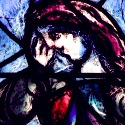
12.14.11 (Kislev 18, 5772) Of all the sins of mankind, perhaps the most devastating is the sin of pride (i.e., ga'avah: גַּאֲוָה), that is, the self-exalting attitude of heart that assumes that we do not really need God, and that our own strength or virtue is entirely sufficient to succeed in life... This existential posture leads, in turn, to the "absolutizing" of the ego -- a form of self-worship that ascribes a godlike status to the soul. And since the personal will is made supreme (ie., "my will be done, on earth as it is in heaven..."), pride tends to justify using people as means to an end (rather than as "ends in themselves"), and therefore is inherently dehumanizing. In short, pride is the soul's attempt to rationalize various forms of selfishness, and insofar as selfishness alienates us from one another (and from God), pride may be regarded as a primary source of sin, which is the separation from God Himself:
כִּי־רָם יְהוָה וְשָׁפָל יִרְאֶה
וְגָבהַּ מִמֶּרְחָק יְיֵדָע
ki · ram · Adonai · ve·sha·fal · yir·eh
ve·ga·vo·ha · mim·mer·chak · ye·ye·da'

"For though the LORD is high, he sees the lowly,
but the haughty He knows from a distance"
(Psalm 138:6)

God knows the haughty soul "from a distance" (מִמֶּרְחָק) because the proud person refuses to return to Him. Though God is omnipresent, the arrogant soul "pushes Him away" and thereby is hostile before the Divine Presence. Tragically this leads to a lifestyle of defiance, inner fragmentation, and eventual madness, since God's power is brilliantly and inescapably revealed in all of creation at all times (Psalm 19:1-4; Isa. 6:3). Therefore the arrogant person lives in a state of living hell, because he willfully separates himself - he closes his eyes - to the truth of his inward condition and his true need for God's love.... Similarly we notice that inordinate shame is a really a kind of pride, since it likewise pushes God away, though it does so using the pretext of "unworthiness" or self-contempt over its failure to manifest perfection. Both pride and shame deny sin, but for different reasons. In either case, however, the self is absolutized and made all-important, and therefore the soul removes itself from the Divine Presence...
The solution to the devasting problem of pride is genuine teshuvah (returning to God), which is a miracle from heaven likened to rebirth itself....
וְנָתַתִּי לָכֶם לֵב חָדָשׁ
וְרוּחַ חֲדָשָׁה אֶתֵּן בְּקִרְבְּכֶם
וַהֲסִרתִי אֶת־לֵב הָאֶבֶן מִבְּשַׂרְכֶם
וְנָתַתִּי לָכֶם לֵב בָּשָׂר
ve·na·ta·ti · la·khem · lev · cha·dash
ve·ru·ach · cha·da·shah · e·ten · be·kir·be·khem
va·cha·si·ro·ti · et · lev · ha·e·ven · mi·be·sar·khem
ve·na·ta·ti · la·khem · lev · ba·sar

"And I will give you a new heart,
and a new spirit I will put within you.
And I will remove the heart of stone from your flesh
and I will give you a heart of flesh."
(Ezek. 36:26)
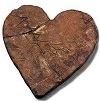
For those who struggle with pride, anger, and hardness of heart, please take hold of hope. God can turn "stone to flesh" and make you fully alive by His power. May He perform a divine "heart transplant" so that you may feel the heartbeat of the Spirit within you!
The mark of teshuvah is humility (anavah), since God cannot have a relationship with someone who is deluded about who they really are and what they really need... "For thus says the One who is high and lifted up, who inhabits eternity, whose name is Holy: "I dwell in the high and holy place, and also with him who is of a contrite and lowly spirit, to revive the spirit of the lowly, and to revive the heart of the contrite" (Isa. 57:15). "All these things my hand has made, and so all these things came to be, declares the LORD. But this is the one to whom I will look: he who is humble and contrite in spirit and trembles at my word" (Isa. 66:2).
May the LORD give each of us the gift of heartfelt humility and wonder before everyone and everything... "Holy, holy, holy, is the LORD God Almighty; the whole earth is full of his glory!" (Isa. 6:3). May you be given the grace to see every lilly of the valley arrayed in God's glory, and every bush of the field aflame with His Presence... Shalom chaverim.
Unto us a Child is Born...
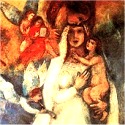
12.14.11 (Kislev 18, 5772) During this time of year we often read the story of birth of Yeshua and thank God that He sent his Son for our salvation. And if Yeshua was indeed born some time during the holiday of Sukkot, he would have been conceived by the Holy Spirit about three months later - around the season of Chanukah - when he began his glorious advent as the true Light of the world (for more on this topic, see "Was Jesus really born on December 25th?").
Regardless of the exact date of his birth, however, the Jewish prophets foretold that Yeshua was "born to die" as our Suffering Servant (Mashiach ben Yosef), though He would also rule and reign over the world God's appointed King (Mashiach ben David). "Unto us a child is born" - this is the First Advent - when the Messiah would be rejected, suffer, and die for our sins; and "unto us a son is given" - this is the Second Advent - when the Messiah will reign as David's greater regent in the kingdom promised to Zion.
כִּי־יֶלֶד יֻלַּד־לָנוּ בֵּן נִתַּן־לָנוּ
וַתְּהִי הַמִּשְׂרָה עַל־שִׁכְמוֹ
וַיִּקְרָא שְׁמוֹ פֶּלֶא יוֹעֵץ
אֵל גִּבּוֹר אֲבִיעַד שַׂר־שָׁלוֹם
ki · ye·led · yu·lad · la·nu, · ben · nit·tan · la·nu
va·te·hi · ham·mis·rah · al · shikh·mo
va·yi·kra · she·mo · pe·le · yo·etz
El · gib·bor, a·vi · ad, sar · shalom

"For to us a child is born, to us a son is given;
and the government shall be upon his shoulder,
and his name shall be called: Wonderful Counselor,
Mighty God, Father of Eternity, Prince of Peace."
(Isa. 9:6)
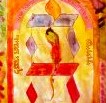
Notice that the four terms used to describe this coming King clearly transcend the historical figure of any earthly king of Israel. For example, the word "pele" in pele yo'etz (wonderful counselor) is used in Judges 13:18 regarding the name of the Angel of the LORD (who in verse 22 is identified as God). El Gibbor (Mighty God) is clearly a title for the Holy One of Israel (Isa. 10:20-21; Psalm 24:8). Avi'ad (Father of Eternity) refers to God as Avinu Malkenu (see Isaiah 63:16, 1 Chron. 29:10; Psalm 68:5; Mal. 2:10). And as for Sar Shalom (Prince of Peace), both the Talmud and Scripture refer to "the Name of God as Peace" (Shab. 10b, Judges 6:24). It is clear, therefore, that these terms are designations for the LORD God of Israel and not merely that of a human being (for more on this, see this page).
Many Christians focus on Isaiah 9:6 and rightly link it to the nativity account of the gospels, but it is important to understand that the promise is also linked to the eschatological future: "Of the increase of his government and of peace there will be no end, on the throne of David and over his kingdom, to establish it and to uphold it with justice and with righteousness from this time forth and forevermore. The zeal of the LORD of hosts will do this" (Isa. 9:7; Luke 1:32-33). Notice that the phrase "his rule will be increased" (לְםַרְבֵּה הַמִּשְׂרָה) is spelled using a closed Mem (ם) instead of the usual open Mem (מ), which suggests that the authority of the One to whom the rule will be given is final and complete. The "child that was born" will be soon be revealed as "the Son that is given" to Israel. One day soon Yeshua will return to Zion (i.e., Jerusalem) to establish His kingdom and fulfill God's promises to Israel. That day and hour are close... Come quickly, LORD!
 |
A Vision of the Coming Day
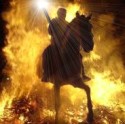
12.14.11 (Kislev 17, 5772) "Then I saw heaven opened, and behold, a white horse! The one sitting on it is called Faithful and True (נֶאֱמָן וְיָשָׁר), and in righteousness he judges and makes war. His eyes are like a flame of fire, and on his head are many diadems, and he has a name written that no one knows but himself. He is clothed in a robe dipped in blood, and the name by which he is called is The Word of God (דְּבַר הָאֱלהִים). And the armies of heaven, arrayed in fine linen, white and pure, were following him on white horses. From his mouth comes a sharp sword with which to strike down the nations, and he will rule them with a rod of iron. And He will tread the winepress of the fierce fury of the wrath of God, the Ruler over All (παντοκράτωρ), the LORD God Almighty (יְהוָה אֱלהֵי צְבָאוֹת). On his robe and on his thigh he has a name written, King of kings (מֶלֶךְ הַמְּלָכִים) and Lord of lords (אֲדנֵי הָאֲדנִים). And with the breath of his lips He will slay the wicked." - Rev. 19:11-16
 |
Be not Afraid...

12.14.11 (Kislev 18, 5772) Nachman of Breslov once said that "The whole earth is a very narrow bridge (kol ha'olam kulo), and the important thing is never to be afraid." Yeshua is the Bridge to the Father, the narrow way of passage that leads to life. He calls out to us in the storm of this world, "Take heart. It is I; be not afraid" (Matt. 14:27). When Peter answered the call and attempted to walk across the stormy waters, he lost courage and began to sink, but Yeshua immediately reached out his hand and took hold of him, saying, "O you of little faith, why did you doubt (lit., think twice)?"
Yeshua is "the Voice of the Living God (קוֹל אֱלהִים חַיִּים) speaking from the midst of the fire" who understands our need: "I have surely seen the affliction of my people who are in Egypt and have heard their cry... I know their sufferings" (Exod. 3:7; Heb. 4:15). A midrash says that the Ten Plagues were needed – not to convince Pharaoh that the LORD was God – but rather to convince the children of Israel of God's love! After all, without faith in that, Israel would never have ventured to leave Egypt. The same could be said of the greater judgment to come upon this world. The ultimate purpose of yissurei ahavah, "the troubles of love," is to turn us away from the source of what keeps us in bondage. As we hear the "footsteps of the Messiah" approaching nearer, let us take hope in the words of our Messiah and Savior: "when you see these things taking place, you know that the time is near, right at the door" (Mark 13:29).
"All the world was created for the Messiah" (Sanhedrin 98b), and since that is so, we can have confidence that all things work together for good. God repeatedly tells us not to be afraid - al-tirah – not of man, nor of war, nor of tribulation, nor even of death itself (Rom. 8:35-39). Indeed, Yeshua came to die to destroy the power of death, "and to release all those who through fear of death were subject to lifelong slavery" (Heb. 2:14-15). The resurrection of the Messiah is the focal point of history - not the "dust of death." Death does not have the final word. Indeed, because Yeshua is alive, we also shall live (John 14:19). Because of Yeshua's victory, we can now live without fear: al-tirah, "Be not afraid, it is I."
יְהוָה אוֹרִי וְיִשְׁעִי מִמִּי אִירָא
יְהוָה מָעוֹז־חַיַּי מִמִּי אֶפְחָד׃
Adonai · o·ri · ve·yish·i, · mi·mi · i·ra
Adonai · ma·oz · chai·yai, · mi·mi · ef·chad

"The LORD is my light and my salvation; whom shall I fear?
The LORD is the stronghold of my life; of whom shall I be afraid?"
(Psalm 27:1)

Download Study Card
Freedom from Religious Games...

12.13.11 (Kislev 16, 5772) The inner is not the outer. Worldly religion will always be popular because there is a market for those who want to clean the "outside of the cup," to "manage appearances," and ultimately to justify themselves. But lipstick on a pig doesn't change the nature of a pig, and therefore the best that such "religion" can offer is an institutionalized sanction or "excuse" for the inner depravity that invariably attends unregenerate life... Hence we see the abomination of various religions that seek worldly conquest or that literally desire to murder others "in the name of God"...
No, the real need of people goes well beyond what mere religion, rituals, and the dubious ideal of karma can provide. Genuine spirituality involves teshuvah, rebirth and salvation of the soul from the power of sin and death... People don't need "religion" or "rituals" to help them feel good about themselves -- they need life from the dead... In a very real way, Yeshua came to set us free from the religious game. The only question of eternal significance therefore is, Where is your hope? Does Yeshua live inside of you? (Col. 1:27)
 |
Hell and Acceptance

12.12.11 (Kislev 15, 5772) "For God so loved the world" that he became entirely unesteemed -- "despised and rejected of men, a man of pains, acquainted with grief" (Isa. 53:3) – so that he could taste rejection, sorrow, pain, and death for every man (Heb. 2:9). "For our sake God made him to be sin who knew no sin, so that in Him we might become the righteousness of God" (2 Cor. 5:21). It was the love of God that put Yeshua on the Cross, and because of Yeshua, God forever exchanges our inner hell and abandonment with His everlasting love and acceptance....
נִבְזֶה וַחֲדַל אִישִׁים
אִישׁ מַכְאבוֹת וִידוּעַ חלִי
וּכְמַסְתֵּר פָּנִים מִמֶּנּוּ
נִבְזֶה וְלא חֲשַׁבְנֻהוּ
niv·zeh · va·cha·dal · i·shim
ish · makh·o·vot · vi·du·a · cho·li
u·khe·mas·ter · pa·nim · mim·me·nu
niv·zeh · ve·lo · cha·shav·nu·hu

"He was despised and rejected by men;
a man of sorrows and acquainted with grief
and we hid, as it were our faces from Him.
He was despised and we esteemed him not"
(Isa. 53:3)
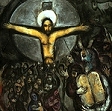
Note: God's love for us is ultimately a mystery, though it is a mystery disclosed by the cry of the heart for His eternal love... The idea that God offers up his own suffering to put an end to our alienation is not hard for the heart to comprehend, though human reason may stumble over the idea, and indeed be scandalized by the message of the cross... However, as Blaise Pascal once said, "the heart has reasons that reason cannot know" (Pensées), and this certainly applies to the passionate and all-consuming love of God.
No Place of Neutrality

12.12.11 (Kislev 15, 5772) Where it is written, "God gave them over to their stubborn hearts, to follow their own devices" (Psalm 81:12; Rom. 1:24); and "they went backward and not forward" (Jer. 7:24), we learn there is no place of "neutrality" or studied indifference toward God... We are either going forward with Him or going backward; we are either drawing near or pulling our hearts away... (Rev. 3:16). As Heschel once rightly said, "God is of no importance unless He is of supreme importance" (Man is Not Alone).
As it is written, "Today, if you hear his voice, do not harden your heart..." (Heb. 3:15). Thank God for the gracious miracle of teshuvah (turning back to God), since without that gift, there would be no abiding hope.
Parashat Vayeshev - וישב
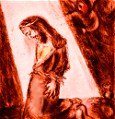
[ The following is related to this week's Torah reading, Parashat Vayeshev. Please read the Torah portion to "find your place" here. ]
12.11.11 (Kislev 15, 5772) From the beginning of this week's Torah portion (Vayeshev) until the end of Sefer Bereshit (the Book of Genesis), the focus shifts from Jacob to his twelve sons, but most especially to his beloved son Joseph (יוֹסֵף). What initially appears as a sequence of terrible hardships for Joseph finally results in the deliverance of the Jewish people during a time of great tribulation. The story of Joseph's ordeal is therefore the story of Divine Hashgachah (providential supervision) that also foretells the glory of the Messiah both as a suffering servant and as a national deliverer of Israel.
The Torah reading begins, "Jacob settled (vayeshev Ya'akov) in the land of his father's sojourning, in the land of Canaan" (Gen. 37:1), but then immediately turns to the story of Joseph, who was seventeen years old at the time: "And these were the generations of Jacob: Joseph being seventeen years old..." (Gen. 37:2). Why does the toldot (genealogy) of Jacob begin with Joseph rather than Reuben (the firstborn son of Leah) here? Was the Torah suggesting that Joseph was regarded by Jacob as his (chosen) "firstborn" son?
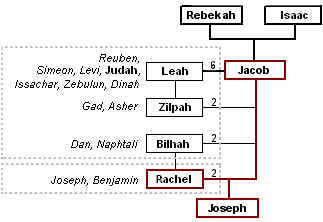
Jacob and Joseph undoubtedly shared a lot in common, and this surely caused Jacob to prefer his firstborn son (of Rachel) over his other sons. For instance, both men had infertile mothers who had difficulty in childbirth; both mothers bore two sons; and both were hated by their brothers. In addition, the Torah states that Jacob loved Joseph more than all his other sons since he was the son of his old age, and was the firstborn son (bechor) of his beloved wife Rachel. Indeed, Jacob made him an ornamented tunic (ketonet passim) to indicate his special status in the family.
At any rate, the Talmud (Sanhedrin 106a) notes that whenever the word vayeshev (וַיֵּשֶׁב) is mentioned in Torah, it introduces a painful episode. Immediately following the statement that "Jacob settled (vayeshev Ya'akov) in the land of his father's sojourning," the Torah states that Joseph brought an "evil report" about his brothers to his father. This act ultimately led to the selling of Joseph into slavery and to further heartache for Israel. The Jewish sage Rashi notes that whenever someone called by God wants to "settle down" and live at ease, God orchestrates events to keep him free from complacency. This certainly happened in the case of Jacob, where sibling rivalry and baseless hatred (called sinat chinam, (שִׂנְאַת חִנָּם)) so disrupted the peace of the family that his children were eventually led into exile and slavery.
Hebron (חֶבְרוֹן) is one of the very first places Abraham lived after he entered the Promised Land (Gen. 13:18). Some of the sages note that the "Valley of Hebron" (i.e., the place from which Jacob commissioned Joseph to go check on his brothers (Gen. 37:14)), should rather be translated as "from the depth of Hebron" (מֵעֵמֶק חֶבְרוֹן), suggesting that Joseph's assignment was the first step toward fulfilling the prophecy the LORD gave to Abraham of Israel's descent into Egypt (Gen. 15:13). The word Hebron comes from a root (ח.ב.ר) that means "association" or "union," suggesting that from the depths of the family union would come struggle but eventual deliverance.
Note: This year Chanukah begins on Tuesday, December 20th at sundown (1st candle) and runs through Wednesday, December 28th.
 |
New Handy Shabbat Guide
with the LORD's Prayer in Hebrew...
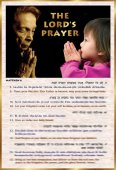 
12.11.11 (Kislev 15, 5772) Now you can perform your own Messianic Shabbat home celebration with confidence! Using this simplified single-page guide, you will be able to recite the traditional Hebrew blessings with ease! The laminated page includes the traditional steps, each with the Hebrew, transliteration, and English translation. On the other side of the Shabbat Guide you will find the "Lord's Prayer" in Hebrew, which may be incorporated as part of your Shabbat celebration or perhaps even framed as a poster for your home... Learn the prayer Yeshua taught His disciples to pray!
You can click here for more information...
The Inner is not the Outer...

12.09.11 (Kislev 13, 5772) A basic principle of spiritual life is that the "inner is not the outer," and vice-versa. People are easily deceived by mere appearances, yet the eye of faith always looks beyond surface phenomena to discern the underlying Reality that upholds the world. This is perhaps most evident in the case of the cross of Yeshua, where it appeared to the carnal eye that he was vanquished and proven to be a false Messiah; to the eye of faith, however, the reality of His resurrection is the source of all genuine power in the universe itself... Those who rely on mere appearance to determine reality will invariably find themselves confounded. As the LORD commissioned the prophet Isaiah: "Go, and say to this people: "'Keep on hearing, but do not understand; keep on seeing, but do not perceive.' Make the heart of this people dull, and their ears heavy, and blind their eyes; lest they see with their eyes, and hear with their ears, and understand with their hearts, and turn and be healed" (Isa. 6:9). Moses foresaw the ongoing stupor of people in relation to the truth of God (Deut. 29:4). God would "hide his face" in judgment because "they know not, nor do they discern, for he has smeared their eyes so that they cannot see, and their hearts, so that they cannot understand" (Isa. 44:18). God "gave them over to their stubborn hearts, to follow their own devices" (Psalm 81:12; Rom. 1:24); they went "backward and not forward" (Jer. 7:24). There is no place of neutrality or indifference toward God - you are either going forward with Him or you are going backward (Rev. 3:16).
When the prophet Samuel was commanded to anoint Israel's next king from among the sons of Jesse, he was admonished not to be distracted by the outward form and superficialities that mark the way of men and their vanities. After being initially impressed with the outer stature of the firstborn son Eliab (אֱלִיאָב), the LORD said: "Do not look on his appearance or the height of his stature..." Why? Because God often delights to chose the least likely of candidates to confound those who are large in their own eyes: "For it is not as a man sees - for man looks with the eyes - but the LORD looks at the heart." Therefore it was David - the youngest son, the overlooked, the lowly family servant covered with schmutz from tending the sheep - who was divinely chosen to be king... It was David who had the "beautiful eyes" (יְפֵה עֵינַיִם), that is, who had eyes of faith to behold the goodness of the LORD (1 Sam. 16:12)... God turns everything upside down: what is big in this world is small in the world to come, and vice-versa.
כִּי לא אֲשֶׁר יִרְאֶה הָאָדָם
כִּי הָאָדָם יִרְאֶה לַעֵינַיִם
וַיהוָה יִרְאֶה לַלֵּבָב
ki · lo · a·sher · yir·eh · ha-a·dam,
ki · ha-a·dam · yir·eh · la·ei·na·yim,
va·do·nai · yir·eh · lal·le·vav

"For it is not as a man sees -
for man looks with the eyes -
but the LORD looks at the heart" (1 Sam. 16:7)

This is a great theme of Scripture, as the Apostle Paul reminds us: "God chooses what the world thinks is foolish to put to shame the so-called wise, and God chooses what the world thinks is weak to put to shame the so-called strong. And God chooses what is insignificant and despised in this world - even things that are not, to nullify the things that are, so that no one may boast in the Divine Presence" (1 Cor. 1:27-29).
It is not the "what" of life that matters as much as its "how." How we choose to encounter reality will ultimately determine what that reality means. Choosing to believe in the Divine Presence will enable us to find courage and transform us into agents of faith and God's power in this world. As Yeshua Himself said, "According to your faith, be it done unto you."
Just as the heart is the central organ of the physical body, so in a spiritual sense it is the center of the inclination or will... A good heart, a pure heart (lev tahor) is therefore essential to our health in the spirit. Your faith is the source of your courage in these days of sojourning... May God strengthen your heart to serve Him in the truth.
בָּרוּךְ יְהוָה אֱלהִים אֱלהֵי יִשְׂרָאֵל
עשֵׂה נִפְלָאוֹת לְבַדּוֹ
וּבָרוּךְ שֵׁם כְּבוֹדוֹ לְעוֹלָם
וְיִמָּלֵא כְבוֹדוֹ אֶת־כּל הָאָרֶץ אָמֵן וְאָמֵן
ba·rukh · Adonai · E·lo·him · E·lo·hei · Yis·ra·el
o·seh · nif·la·ot · le·va·do
u·va·rukh · shem · ke·vo·do · le·o·lam
ve·yim·ma·lei · khe·vo·do · et · kol · ha·a·retz: A·men · ve·a·men

"Blessed be the LORD, the God of Israel,
who alone makes wonders!
Blessed be his glorious name forever;
His glory fills all the world! Amen and Amen!"
(Psalm 72:18-19)

Stay strong and be of good cheer, chaverim. We overcome the world by trusting in God's salvation and power. Yeshua is on the throne today and forevermore! Shabbat Shalom!
Parashat Vayishlach - וישלח
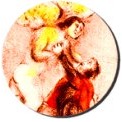
[ The following entry is related to this week's Torah reading (Vayishlach). Please read the Torah portion to "find your place" here. ]
12.05.11 (Kislev 9, 5772) The Torah reading for this week (Vayishlach) includes the account of Jacob's famous wrestling match with the Angel of the LORD (מַלְאַךְ יְהוָה) that occurred just before he faced his estranged brother Esau. During the "grappling" (recall the meaning of Jacob's name), the Angel injured Jacob's thigh, but Jacob refused to release his hold until he received the blessing (הַבְּרָכָה). The LORD then asked him, "What is your name (מַה־שְּׁמֶךָ)?" And he said, "Jacob" (i.e., Ya'akov: יַעֲקב). The Angel then declared to him, "Your name shall no longer be Ya'akov ("heel holder" [of Esau]) but Yisrael ("contender with God"), for as a prince (i.e., sar: שַׂר) you have contended (i.e., sarita: שָׂרִיתָ) with God and with men and have prevailed" (Gen. 32:28).
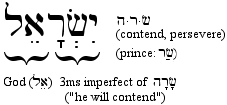 |
After Jacob was renamed Israel (יִשְׂרָאֵל), he asked the Angel for His Name, but was denied, since the Name is unutterable - even to one who had prevailed with God. Jacob then called the name of the place "the face of God" (i.e., Peniel: פְּנִיאֵל) since "I have seen God face to face (i.e., panim el panim: פָּנִים אֶל־פָּנִים) and yet my life has been spared" (Gen. 32:30).
Notice that after Jacob encountered God and wrestled with Him, he was wounded so that he walked with a limp... And so it is with the walk of faith. Who among us has not been broken before coming to know the LORD? As Tozer reminds us, "It is doubtful whether God can bless a man greatly until he has hurt him deeply." Beware of a pastor or spiritual leader who does not walk with a limp, chaverim....
קָרוֹב יְהוָה לְנִשְׁבְּרֵי־לֵב
וְאֶת־דַּכְּאֵי־רוּחַ יוֹשִׁיעַ
ka·rov · Adonai · le·nish·be·rei · lev,
ve·et · dak·ei · ru·ach · yo·shi·a

"The LORD is near to the brokenhearted
and saves the crushed in spirit." (Psalm 34:18)

Download Study Card
As I consider Jacob's life -- and how he was wounded before he could return to the land of promise -- I am somewhat saddened. After all, his homecoming was painful, to say the least. Along the way, his beloved wife Rachel died while giving birth; his hip was permanently dislocated as he wrestled the Angel of the LORD; his meeting with his brother Esau was a frightening ordeal; and when he finally made it back home to Chevron, he discovered that his mother Rebekah had died. His father Isaac soon would die afterward....
Our way in this world is often painful, and our "education for eternity" often causes us heartache. The LORD Himself, however, is our great consolation, and yesh ohev davek me'ach - "there is a lover who cleaves more than a brother" (Prov 18:24b).
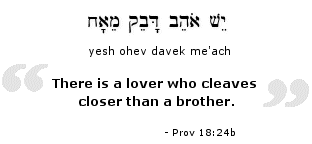
Shabbat "Table Talk" for Vayetzei
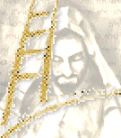
[ The following is related to this week's Torah reading, Parashat Vayetzei. Please read the Torah portion to "find your place" here. ]
12.02.11 (Kislev 6, 5772) Among other things, in this week's Torah portion the LORD appears to Jacob in a dream, presenting the famous vision of the ladder from heaven to earth.... As I have tried to explain elsewhere, this dream was ultimately a revelation of the coming glory of the resurrected Messiah Himself, the "place" of meeting God's exalted and Sacrificial Presence. And as the New Testament makes clear, it was Yeshua, the Angel of the LORD, who came to "descend" (as the Son of Man) and to "rise" (as the resurrected LORD) to be our Mediator before God (see John 1:47-51).
To make it a bit easier to work through some of the text of this portion, I created a brief summary of the reading along with a set of questions and answers. Hopefully this material will prompt some interesting (and enjoyable) discussion for your Sabbath, chaverim. You can download the PDF file from the linked page (above) or by directly clicking here:
It is a glorious truth of Scripture that the LORD waits to be gracious to you, and therefore he "exalts himself" to show mercy to you:
וְלָכֵן יְחַכֶּה יְהוָה לַחֲנַנְכֶם
וְלָכֵן יָרוּם לְרַחֶמְכֶם
כִּי־אֱלהֵי מִשְׁפָּט יְהוָה
אַשְׁרֵי כָּל־חוֹכֵי לוֹ
velakhen · yechakeh · Adonai · lachananchem
ve'lakhen · yarum · lerachemkhem
ki · Elohei · mishpat · Adonai
ashrei · kol · chokhei · lo

"Therefore the LORD waits to be gracious to you,
and therefore he exalts himself to show mercy to you.
For the LORD is a God of justice;
blessed are all those who wait for him."
(Isa. 30:18)
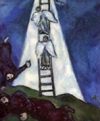
"Blessed are those whose strength is in You, in whose heart are the highways to Zion" (Psalm 84:5). Shabbat Shalom to you all! May the peace of God (שְׁלוֹם אֱלהִים) that "surpasses all understanding" guard your heart and mind in Yeshua our Messiah (Phil. 4:9).
Personal Update: Please keep me in your prayers, chaverim, as I have been sick with a cold for over a month now. Thank you!
יְהוָה עז לְעַמּוֹ יִתֵּן
יְהוָה יְבָרֵךְ אֶת־עַמּוֹ בַשָּׁלוֹם
Adonai · oz · le·am·mo · yit·ten,
Adonai · ye·va·rekh · et · am·mo · va·sha·lom

"The LORD will give strength to his people;
The LORD will bless his people with peace" (Psalm 29:11)

Download Study Card
|














































